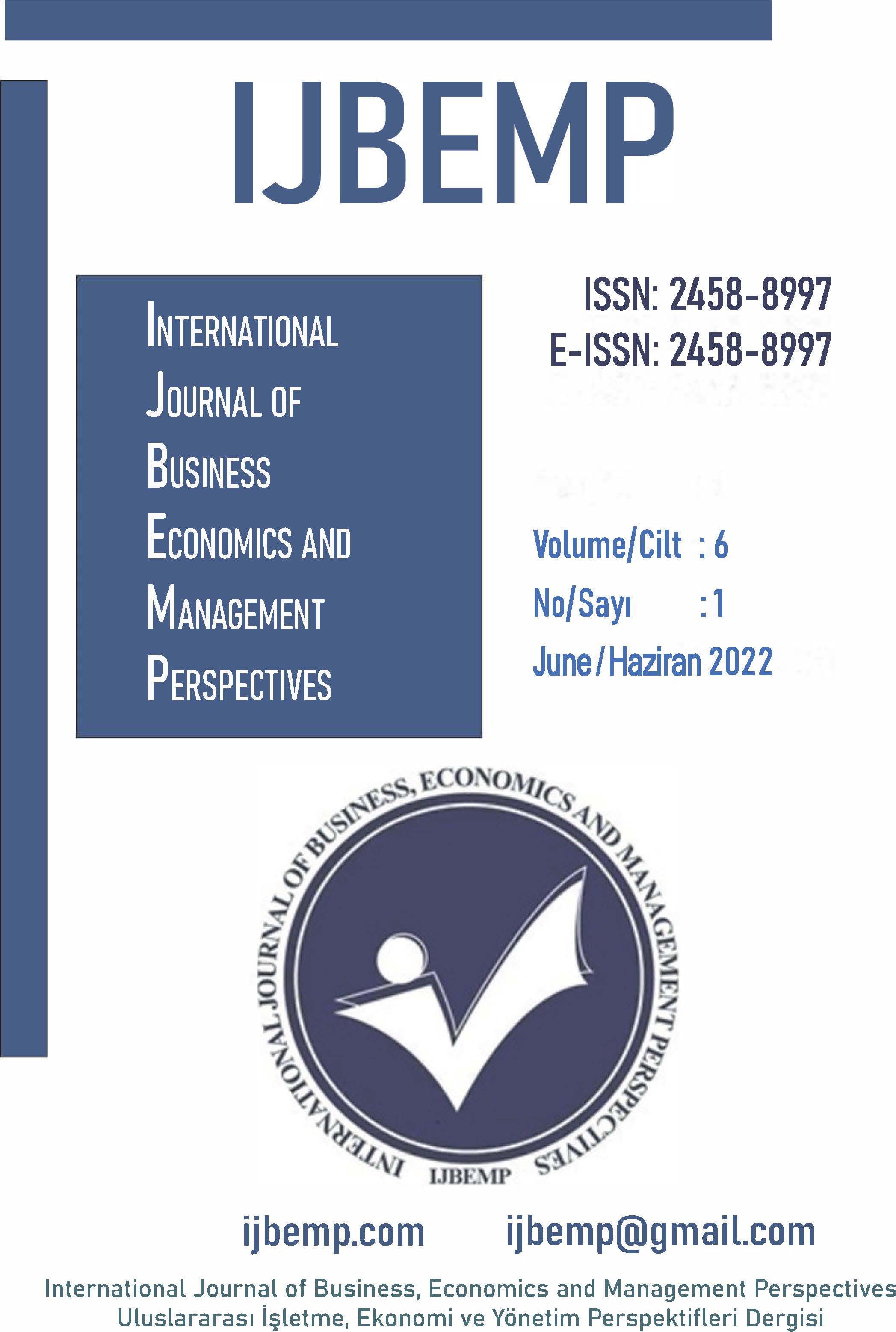Author :
Abstract
Bu çalışma, ilkokul ve ortaokul eğitimi veren özel okullarda görev yapan öğretmenlerde işe yabancılaşma ve örgütsel sinizmin üretkenlik karşıtı iş davranışlarına etkisini ortaya koymak amacı ile yapılmıştır. Araştırma sonucuna göre yabancılaşmanın güçsüzleşme, anlamsızlaşma ve kendine yabancılaşma alt boyutları ile üretkenlik karşıtı iş davranışları üzerinde anlamlı bir etkinin olduğu; örgütsel sinizmin duyuşsal ve bilişsel alt boyutları ile üretkenlik karşıtı iş davranışları üzerinde anlamlı bir etkinin olduğu ancak davranışsal alt boyutu ile üretkenlik karşıtı iş davranışları üzerinde anlamlı bir etkinin olmadığı görülmüştür.
Keywords
Abstract
The aim of this study is to determine the effect on the alination and organizational cynicism in deviant workplace behaviours of working teachers in primary and secondary education. According to the results of the research, there is a significant effect between the sub-dimensions of work alination, empowerment, meaninglessness and self-alination and anti-productive work behaviors; it is seen that there is a significant effect between the affective and cognitive sub-dimensions of organizational cynicism and anti-productive work behaviors, but there is no significant effect between the behavioral sub-dimension and anti-productive work behaviors.
Keywords
- Abraham, Ralph (2000). Organizational cynicism: Bases and consequences. Generic, Social and
- Abraham, Ralph (2000). Organizational cynicism: Bases and consequences. Generic, Social and General Psychology Monographs, 126 (3), 269–292.
- Andersson, Lynne M.- Bateman, Thomas S. (1997). Cynicism in the workplace: Some causes and effects. Journal of Organizational Behavior, 18 (5), 449-469.
- Andersson, Lynne M.- Pearson, Christine M. (1999). Tit for tat? The spiraling effect of incivility in the workplace. Academy of Management Review, 24 (3), 452-471.
- Aqueveque, Claudio- Encina, Catherina (2010). Corporate behavior, social cynicism and their effect on individuals’ perceptions of the company. Journal of Business Ethics, 91 (2), 311-324.
- Ball, Gail A.- Trevino, Linda Klebe- Sims, Henry P. (1994). Just and usjust punishment influences on subordinate performance and citizenship. Academy of Management Journal, 37, 299-322.
- Baron, Robert A.- Neuman, Joel H. (1996). Workplace violence and workplace aggression:Evidence on their relative frequency and potential causes. Aggressive Behaviour, 22 (3), 161-240.
- Giacalone, Robert A.- Greenberg, Jerald (1997). Antisocial behavior in organizations. Thousand Oaks, CA: Sage.
- Başaran, İbrahim Ethem (2000). Örgütsel davranış insanın üretim gücü (3. Baskı). Ankara: EkinoksYayıncılık.
- Bolton, Charles (1972). Alienation and cction: A study of peace-group members. The AmericanJournal of Sociology, 78 (3), 537–561.
- Bowker, J. M.- Leeworthy, V. R. (1998). Accounting for ethnicity in recreation demand: A flexible count data approach. Journal of Leisure Research, 30 (1).
- Delken, Menno (2004). Organizational cynicism: A study among call centers UnpublishedDoctoral Thesis. Maastricht University, Holland.
- Dickens, Peter (1996). Reconstructing nature: Alienation, emancipation and the division of labor. London and New York: Routledge.
- Edwards, Paul (1967).The encyclopedia of philosophy, The Macmillan Company The Free Press,
- Erdost, Ebru, Karacaoğlu, Korhan, Reyhanoğlu, Metin (2007). Örgütsel sinizm kavramı ve ilgiliölçeklerin Türkiye’deki bir firmada test edilmesi. 15. Ulusal Yönetim ve Organizasyon Kongresi Bildiriler Kitabı, 514- 524.
- Fromm, Erich (1996). Çağımızın özgürlük sorunu (3. Baskı) (Çev: Güvenç, B.). İstanbul: Gündoğan Yayınevi.
- Güçlü, Abdulbaki- Uzun, Erkan- Uzun, Serkan-Yolsal,Ümit Hüsrev (2003). Felsefe sözlüğü. Ankara: Bilim ve Sanat Yayınları.
- Güney, Salih (2000). Yönetim ve organizasyon el kitabı. Ankara: Nobel Yayın Dağıtım.
- Hegel, Georg Wilhelm Friedrich (1986), Tinin görüngübilimi, çev.: Aziz Yardımlı. İstanbul: İdea Yayınları.
- Hollinger, Richard C.- Clark, Joel P. (1983). Deterrence in the workplace: Perceived certainty, perceived severity and employee Theft. Social Forces, 62 (2).
- Kanter, Donald L.- Mirvis, Philip H. (1989). The cynical americans: Living and working in an age of discontentand disillusion. San Francisco, CA: Jossey- Bass.
- Kılıç, Selçuk (2013). Algılanan örgütsel etik iklim ile üretkenlik karşıtı iş davranışları arasındaki ilişkiler. Doktora Tezi, Niğde Üniversitesi Sosyal Bilimler Enstitüsü, Niğde.
- Marx, Karl (1844). 1844 ekonomik ve felsefi elyazmaları. (Çev: Somer, K. (2011)). Ankara: SolMetzger, Mark D. (2004). A qualitative inquiryinto the formation of beliefs in a policeorganization, Doctoral Thesis, The George Washington University: Washington.
- Naus, Aalphones Johannes (2007). Organizational cynicism on the nature, antecedents andconsequences of employee cynicism toward the employing organization, UnpublishedDoctoral Thesis, Maastricht University: Maastrich.
- Özgener, Şevket, Öğüt, Adem, Kaplan, Mehmet (2008). İşgören-işveren ilişkilerinde yeni birparadigma:Örgütsel sinizm (Editör: M. Özdevecioğlu ve H. Karadal). örgütsel davranışta seçmekonular: organizasyonların karanlık yönleri ve verimlilik azaltıcı davranışlar. Ankara: İlke Yayınevi.
- Robinson, Sandra L.- Bennet, Rebecca J. (1995). Typology of deviant workplace behaviours: A multidimensional scaling Study. The Academy of Managment Journal, 555-572.
- Sarros, James C.- Tanewski, George A.- Winter, Platin- Santora, Joseph C.- Densten, Lain (2002). Work alienation and organizational leadership. British Journal of Management, 13 (4), 285-304.
- Seeman, Melvin (1959). On The meaning of alienation. American Sociological Review, 24, 783-791.
- Spector, Paul E. (2011). The relationship of personality to counterproductive work behavior(CWB): An integration of perspectives. Human Resource Management Review, 21 (4), 342-352.
- Spector, P. E., Fox, S. (2005). The stressor-emotion model of counterproductive workbehavior: investigations of actors and targets, American PsychologicalAssociation, 151-174.
- Uysaler, Alper Lütfi (2010). Örgütsel yabancılaşmanın örgütsel bağlılık, iş tatmini, işten ayrılma eğilimiile bağlantısı ve yabancılaşma yönetimi. Yüksek Lisans Tezi, Gebze Yüksek Teknoloji Enstitüsü, Gebze.
- Vardi, Yoav- Wiener, Yoash (1996). Misbehavior in organizations: A motivational framework. Organizational Science, 7 (2), 151-165.
- Wanous, John P.-Reichers, Arnon E.- Austin, James T. (2000). Cynicism about organizational change:Measurement, antecedents and correlates. Group and Organization Management, 25 (2), 132-153.





